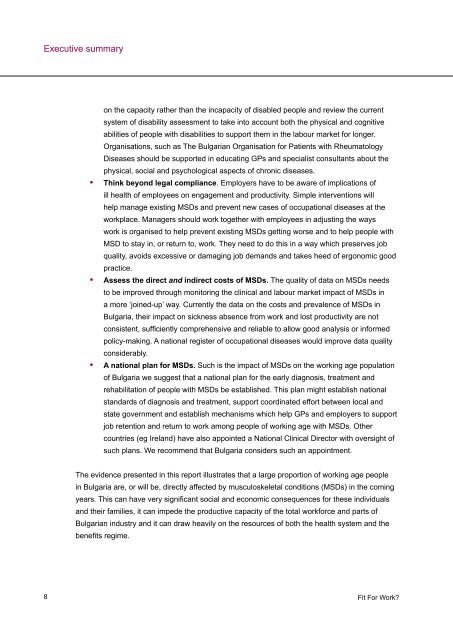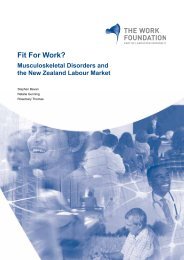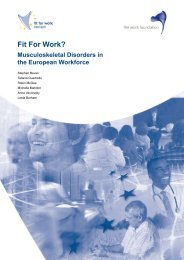FfW Bulgarian report (English language) - Fit for Work Europe
FfW Bulgarian report (English language) - Fit for Work Europe
FfW Bulgarian report (English language) - Fit for Work Europe
You also want an ePaper? Increase the reach of your titles
YUMPU automatically turns print PDFs into web optimized ePapers that Google loves.
Executive summary<br />
8<br />
on the capacity rather than the incapacity of disabled people and review the current<br />
system of disability assessment to take into account both the physical and cognitive<br />
abilities of people with disabilities to support them in the labour market <strong>for</strong> longer.<br />
Organisations, such as The <strong>Bulgarian</strong> Organisation <strong>for</strong> Patients with Rheumatology<br />
Diseases should be supported in educating GPs and specialist consultants about the<br />
physical, social and psychological aspects of chronic diseases.<br />
• Think beyond legal compliance. Employers have to be aware of implications of<br />
ill health of employees on engagement and productivity. Simple interventions will<br />
help manage existing MSDs and prevent new cases of occupational diseases at the<br />
workplace. Managers should work together with employees in adjusting the ways<br />
work is organised to help prevent existing MSDs getting worse and to help people with<br />
MSD to stay in, or return to, work. They need to do this in a way which preserves job<br />
quality, avoids excessive or damaging job demands and takes heed of ergonomic good<br />
practice.<br />
• Assess the direct and indirect costs of MSDs. The quality of data on MSDs needs<br />
to be improved through monitoring the clinical and labour market impact of MSDs in<br />
a more ‘joined-up’ way. Currently the data on the costs and prevalence of MSDs in<br />
Bulgaria, their impact on sickness absence from work and lost productivity are not<br />
consistent, sufficiently comprehensive and reliable to allow good analysis or in<strong>for</strong>med<br />
policy-making. A national register of occupational diseases would improve data quality<br />
considerably.<br />
• A national plan <strong>for</strong> MSDs. Such is the impact of MSDs on the working age population<br />
of Bulgaria we suggest that a national plan <strong>for</strong> the early diagnosis, treatment and<br />
rehabilitation of people with MSDs be established. This plan might establish national<br />
standards of diagnosis and treatment, support coordinated ef<strong>for</strong>t between local and<br />
state government and establish mechanisms which help GPs and employers to support<br />
job retention and return to work among people of working age with MSDs. Other<br />
countries (eg Ireland) have also appointed a National Clinical Director with oversight of<br />
such plans. We recommend that Bulgaria considers such an appointment.<br />
The evidence presented in this <strong>report</strong> illustrates that a large proportion of working age people<br />
in Bulgaria are, or will be, directly affected by musculoskeletal conditions (MSDs) in the coming<br />
years. This can have very significant social and economic consequences <strong>for</strong> these individuals<br />
and their families, it can impede the productive capacity of the total work<strong>for</strong>ce and parts of<br />
<strong>Bulgarian</strong> industry and it can draw heavily on the resources of both the health system and the<br />
benefits regime.<br />
<strong>Fit</strong> For <strong>Work</strong>?







